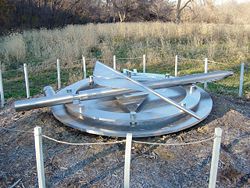- Otoe tribe
-
Otoe Regions with significant populations United States Nebraska, Oklahoma Languages English, Chiwere
Religion Related ethnic groups The Otoe or Oto are a Native American people. The Otoe language, Chiwere, is part of the Siouan family and closely related to that of the related Iowa and Missouri tribes.
Contents
History
The Otoe were once part of the Siouan tribes of the Great Lakes region, a group commonly known as the Winnebago. At some point, a large group split off and began to migrate to the South and West. This group eventually split again, coalescing into at least three distinct tribes: the Ioway, the Missouria and the Otoe. The latter settled in the lower Nemaha River valley. They adopted the horse culture and semi-nomadic lifestyle of the Great Plains, making the American bison central to their diet and culture.[citation needed]
European contact
Following the Louisiana Purchase by the United States, the Lewis and Clark Expedition headed up the Missouri River to explore the new territory. The Otoe were the first tribe they encountered. They met at a place on the west bank of the Missouri River that would become known as the Council Bluff.[1]
Like other Great Plains tribes, the Otoe periodically left their villages to hunt for buffalo. Between 1817 and 1841, the Otoe lived around the mouth of the Platte River in present-day Nebraska. During this time, the remaining families of the Missouria rejoined them. They gathered with others to trade for European goods.[citation needed]
In the 1830s, the tribe was noted to have problems with alcohol, which was widely dispensed by traders. Some Otoe would trade vital supplies for alcohol, to the point of becoming destitute. As their dependence on alcohol grew, the men no longer hunted, but resorted to looting vacant Pawnee villages while the people were out hunting.[2] Christian missionaries built a mission there.
In 1854 the Otoe-Missouria ceded most of their lands south of the Platte River in eastern Nebraska to the U.S. by treaty. They retained the Oto Reservation along the Big Blue River on the present Kansas-Nebraska border. They struggled to adapt to reservation life.
Move to Indian Territory
 Otoe delegation, 1881. Photographer John K. Hillers
Otoe delegation, 1881. Photographer John K. Hillers
During the 1870s, the tribe split into two factions. The Coyote band favored an immediate move to Indian Territory, where they believed they could better perpetuate their traditional tribal life outside the influence of the whites. The Quaker band favored remaining on the Big Blue River land. They were willing to sell the western half of the reservation to whites to gain income for a tribal annuity.
By the spring of 1880, about half the tribe had left the reservation and taken up residence with the Sac and Fox Nation in Indian Territory. By the next year, in response to dwindling prospects of self-sufficiency and continued pressure from white settlers, the remaining Otoe members in Nebraska sold the Big Blue reservation. They migrated to Oklahoma.
With the Otoe-Missouria already there, they purchased a new reservation in the Cherokee Outlet in the Indian Territory. This is in present-day Noble and Pawnee counties, Oklahoma. Today the Otoe-Missouria Tribe of Indians is federally recognized. It is based in Red Rock, Oklahoma.
Notable Otoe
See also
Notes
- ^ Page 47, Lewis & Clark: The Journey of the Corps of Discovery, by Dayton Duncan, Pimlico (1998), 249 pages ISBN 0-7126-6648-6
- ^ Page 200, The Pawnee Indians, by George Hyde, University of Oklahoma Press (1988) (first published 1951, revised edition 1974), trade paperback, 372 pages ISBN 0-8061-2094-0
External links
- Ioway-Otoe Language, Ioway Cultural Institute; Baxoje, the Ioway Nation, on NativeWeb
- Otoe-Missouria Genealogy, Database of members and descendants from reservation, Native Website
Native Americans in Nebraska Tribes Reservations Former reservations Figures Antonine Barada · Big Elk · Chief Blackbird · Joba Chamberlain · Larry EchoHawk · Logan Fontenelle · Francis La Flesche · Joseph La Flesche · Old Lady Grieves The Enemy · Petalesharo · Susan La Flesche Picotte · Red Cloud · Standing Bear · Susette LaFlesche Tibbles · Jim Thorpe · James Young Deer · Moses J. "Chief" Yellow HorsePlaces Blackbird Hill · Nanza · Genoa Indian Industrial School · Ton'wontongathon · Pahur · Ahkawitakol · Lalawakohtito · Pahuk · Pike-Pawnee Village SiteLanguages Events Battle of Ash Hollow · Massacre Canyon · Battle of War Bonnet Creek · Grattan massacre · Cheyenne WarCategories:- Siouan peoples
- Native American history of Nebraska
- Native American history of Missouri
- Native American history of Iowa
- Native American history of Oklahoma
- Native American tribes in Iowa
- Native American tribes in Oklahoma
- Native American tribes in Nebraska
- Plains tribes
Wikimedia Foundation. 2010.




